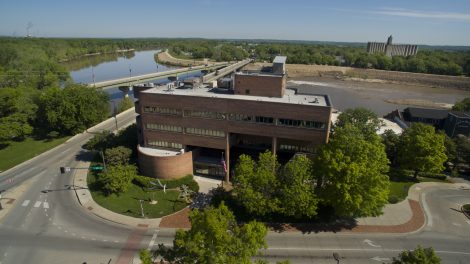City of Lawrence to coordinate cost of growth study to inform development policies

photo by: Nick Krug
Lawrence City Hall, 6 E. Sixth St., is pictured on May 3, 2016.
The question of whether expanding the city’s boundaries to build new neighborhoods ends up benefiting or burdening the city’s budget will soon be answered.
The City of Lawrence will be coordinating a study to determine the cost of growth for various types of development on the overall community and its individual taxing jurisdictions, namely the city, county and school district, according to a staff memo to the City Commission. The study seeks to inform both local governments and development-related organizations.
Assistant City Manager Diane Stoddard said discussions among several organizations, including the local chamber of commerce, the Lawrence Board of Realtors and the Lawrence Home Builders Association, have led to a desire to be working from an agreed-upon set of facts regarding the cost of growth. Stoddard also said the Home Builders Association had indicated it wanted to update a similar study completed in 2001. She said the city wanted all interested entities to participate.
“I think it’s important that if we’re going to do a study, that everyone participate in it and we make sure that everybody is in agreement of the methodology,” Stoddard said. “So that when you get to the point where you’ve got the study results, that everyone buys into them.”
To that end, Stoddard said the city, Lawrence-Douglas County Sustainability Director Jasmin Moore, the Home Builders Association, the Chamber and the Lawrence Association of Neighborhoods would provide input on the selection of a consultant for the study. Once a consultant is chosen, Stoddard said the city would get more feedback from those stakeholders and the public regarding the scope of the study.
Leaders discussed their plans to issue a request for qualifications (RFQ) for the study at the City Commission’s meeting on Tuesday. At that time, some commissioners expressed concern about what groups were involved in coordinating the study. Specifically, Commissioner Stuart Boley said that someone representing sustainability efforts and the environmental concerns should be involved. The commission added Moore to the group to represent those interests.
The objective of the study is to determine the cost of growth for residential, commercial and industrial development for the community as a whole and its individual taxing districts, according to the RFQ. The RFQ states that the consultant should examine current and future growth areas; the immediate, intermediate and long-term costs and benefits of growth; and the economic viability, environmental viability and social acceptability of growth. The objective is to have that data so that policymakers, developers and planners can use it to make decisions on how the city grows.
Stoddard said each of the entities involved in coordinating the study would help pay for it. The cost won’t be known until the city and the other entities have determined what questions the study will answer and how deeply it will dive into those topics, Stoddard said.
Whether growth pays for itself was a central question during the discussion of Plan 2040, the new comprehensive plan for Lawrence and Douglas County that lays out policies that will shape how the community grows for the next 20 years. The plan, which city and county leaders approved this fall, has a new growth policy that encourages infill development as the most cost-effective and environmentally sustainable way for the city to grow.
Plan 2040’s new growth policy prioritizes development within the city’s boundaries and requires developers to meet several requirements to annex land to expand those boundaries. The city maintains that growth needs to be focused in certain areas to be environmentally sustainable and to manage the city’s infrastructure maintenance costs, but the Lawrence Board of Realtors, the Home Builders Association and the Chamber have all expressed concerns about the annexation restrictions, saying they could make both new and existing housing more expensive. More detailed zoning and ordinance changes to implement the policy must still be developed.
The request for qualifications for the study was issued Wednesday, and responses are due by Jan. 17, according to a listing of the city’s open bids. The study is expected to get underway in late February.







